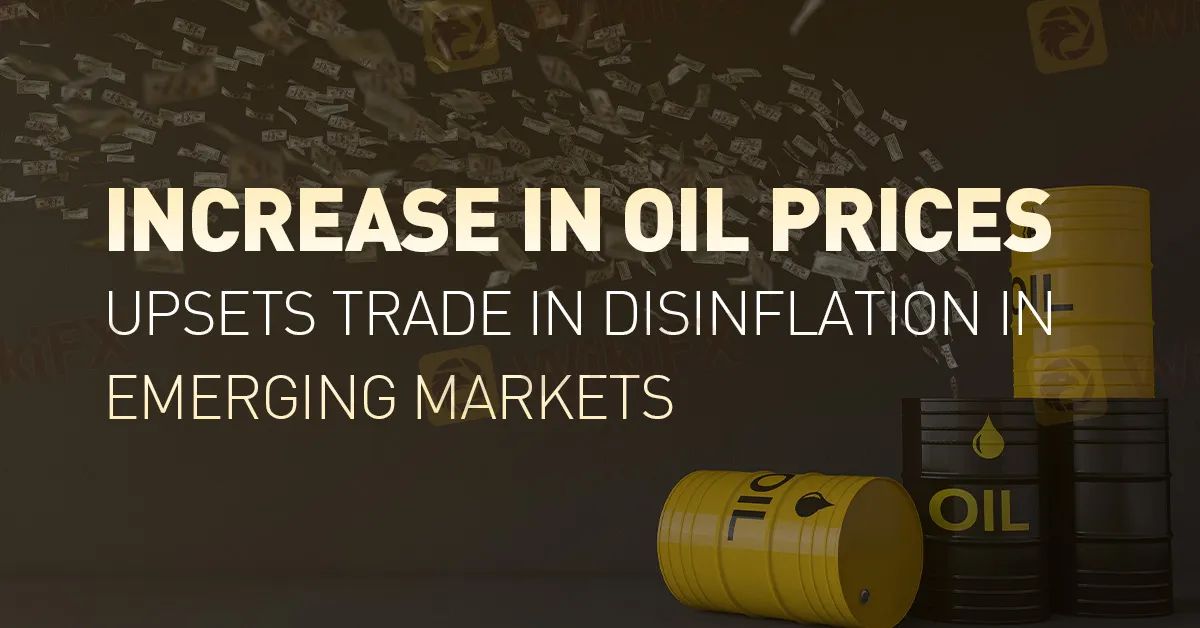Abstract:A few months ago as inflation eased and bets on interest rate cuts arose. The trade has almost completely dried up.

A few months ago as inflation eased and bets on interest rate cuts arose. The trade has almost completely dried up.
As oil prices increased 30%, changing the dynamics for emerging countries, a resurrecting price pressures, dampening expectations for a decline in interest rates, and endangering the fiscal health of energy importers.
This change has the potential to shatter the bets of bulls on emerging markets who had a strong start to the year. As the US promises to keep borrowing prices higher for longer and oil barrels approach the $100 mark, bonds, the Hungarian forint, and the Philippine peso, appear to be more and more vulnerable.
According to Jon Harrison, managing director for emerging-market macro strategy at GlobalData TS Lombard in London, “it is clear that the disinflation trend in EM ex-China has already faltered.” Food prices, a stronger currency, and reduced disinflation from China are other variables in addition to oil prices, which are undoubtedly a significant factor.
Cracks are beginning to appear. Both an MSCI index of developing-nation currencies and a government bonds issued by emerging markets are approaching the end.
The economies on oil imports and those household income will suffer the most, according to a report by Tellimer strategist Hasnain Malik. India, the Philippines, Pakistan, Jordan, Kenya, and Morocco.
According to emerging-market money manager Carlos de Sousa, Vontobel Asset Management is trying to reduce its holdings in areas that are oil imports since the increased price will hurt the countries' currencies and balance of payments.
An survey of five-year government securities from that India's bonds are the ones that are most vulnerable to an increase in oil prices. As assessed by the mean shift divided by reactions, rupee notes have shown the most consistency in their response to a rise in crude prices, with their yields increasing by an average of 13 since 2015.
Smoother Curves
Sonal Varma and other economists at Nomura Holdings Inc. claim that the increase in oil prices will result in higher retail prices in India. This has a minimal impact on inflation but has a greater knock-on effect on the twin deficits.
Given that South Africa is a net oil importer, HSBC Holdings Plc warns that the country's debt could also suffer. As rising oil prices assist normalize producer price disinflation, GlobalData TS Lombard predicts that Chinese debt will be the most resilient at the other end of the range.
According to Esther Law, senior money manager for emerging-market debt at Amundi SA in London, the easing cycle will likely be delayed or slowed down for nations that are adversely affected by oil prices. “In this scenario, we could see the local curve flattening with cuts being priced out.”
The rise in oil prices has had a variety of effects. Costlier crude is a benefit for energy exporters like Malaysia, Mexico, and Saudi Arabia since it might increase tax income.
FX Stress
According to Gal Fichan, senior portfolio manager at Banque Syz SA, the Philippine peso, Indonesian rupiah, Thai baht, and forint are negatively impacted by more expensive crude and the higher dollar on the FX front.
According to Marcella Chow JPMorgan Asset Management, higher oil prices will probably operate as a tax on other nations that are net importers, lowering real wages and delaying GDP. Their central banks may need to keep interest rates at their current level or perhaps raise them to defend their currencies if this puts downward pressure on their currencies.
In the Philippines, where the central bank raise rates further after that, it has already begun to occur.
The following table displays how past rises in the price of oil have affected bonds issued by emerging markets:
Data are based on the following eight events: attack on Saudi oil facilities in 2019, attack on U.S. refineries in 2015, hurricane impact on oil supplies in 2017, OPEC oil curtailment in 2017, U.S.-Russia proxy warfare in Syria in 2018, OPEC curtailment in 2021, Russian invasion of Ukraine in 2022, and tightening of supplies by OPEC+ in 2023.
What to See
· Following a warning from the governor against excessive spending by the country's new government, the Bank of Thailand will publish on Wednesday.
· China will announce the results of its September manufacturing, the outlook for the largest EM economy in the world. After Poland's central bank unexpectedly slashed interest rates by 75 and make their interest rate announcements. Additionally, Poland will present its first-ever inflation data for September.
· After recent dovish moves by Brazil and Chile, investors will be on the lookout.










